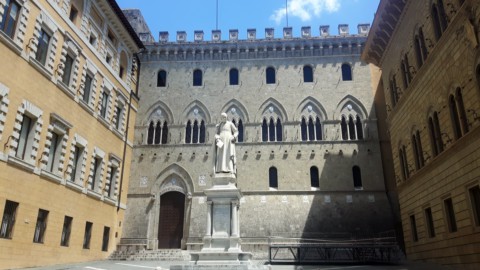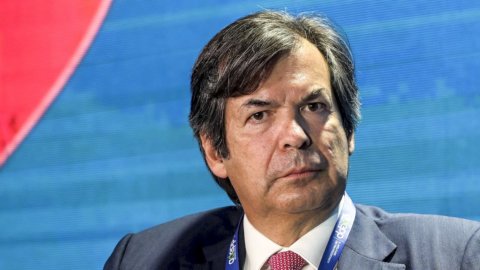On the i interest rates the hawks prevailed again: the rise will be “jumbo”, ie by 75 points, bringing the reference rate to 1,25%, from 0,50%. A painful decision by the ECB led by Christine Lagarde, but for some necessary in the face of inflation that reached an average of 9,1% in August, the gas crisis and the euro at its lowest. “Based on your current assessment – said Lagarde at a press conference in Frankfurt – in the next meetings yes plans to raise interest rates further to curb demand and protect against the risk of a persistent increase in expected inflation" and "guarantee the timely return of inflation to the medium-term objective of 2%", the ECB number one underlined several times at the conference press. The Governing Council – he added – “will regularly review the trajectory of monetary policy in the light of the most recent information and the evolution of inflation prospects. Also in the future rate decisions of reference will be data-driven and will reflect an approach by which they are defined from time to time at each meeting”.
No surprise then, in the end the fear of inflation wins. After up from 50 points in July, which effectively put an end to the era of negative rates, in the clash between hawks and doves on the size of the squeeze, the former once again prevailed even if the maxi-rise could have harmful consequences on an economy already under stress and facing a season made of great uncertainties. However, hesitant action would have raised long-term inflation expectations - from already high levels - weakening the ECB's credibility in the fight against prices, especially when the Fed announces "it will not stop raising rates".
ECB hawkish on rates, more flexible on APP and PEPP
In the end, the Governing Council opted for a more aggressive intervention against inflation, raising all rates by 0,75%. The main rate thus rises to 1,25%, the deposit rate at 0,75% and the marginal lending rate to 1,50%, with effect from 14 September 2022. Given the increase in the deposit facility rate to a level above zero, “the two-tier system for the remuneration of excess reserves is not more necessary. The Governing Council has therefore decided today to suspend the two-tier system by resetting the multiplier. statement from the ECB.
But if the ECB has been more hawkish on rates, on Asset Purchase Program (APP) e Pandemic Emergency Purchase Program (PEPP) is more flexible. The Governing Council intends to continue to reinvest in full the principal payments of maturing securities purchased under the APP for an extended period of time beyond the date on which it started raising the key ECB interest rates and, in any case, for as long as necessary to maintain ample liquidity conditions and an appropriate monetary policy stance”.
As regards the PEPP, the Governing Council “intends to reinvest the principal payments of maturing securities purchased under the at least until the end of 2024. In any case, the future roll-off of the PEPP portfolio will be managed so as to avoid interference with the appropriate monetary policy stance”. Finally, maturing redemptions in the PEPP portfolio are reinvested “flexibly, in order to counter the risks to the monetary policy transmission mechanism related to the pandemic”.
Anti-spread shield to counter market unrest
As for the anti-spread shields (Tpi), the ECB statement reads: “The Governing Council is ready to adjust all its instruments within the scope of its mandate to ensure that inflation stabilizes at its target of 2 % in the medium term. The IRR is available to counter unwarranted and disorderly market dynamics that pose a serious threat to the transmission of monetary policy in all euro area countries, thus enabling the Governing Council to fulfill its mandate to preserve stability more effectively of prices".
ECB: more pessimistic about growth and inflation
The ECB's forecast updates will surely show markedly higher inflation and significantly weaker economic growth. Prediction on inflation made in July by the staff for 2022 (6,8%) has been heavily revised upwards, which is now expected to average at8,1% in 2022, 5,5% in 2023 and 2,3% in 2024”. Over time, however, "inflation will decrease as the current inflationary factors ease and the normalization of monetary policy spreads in the economy and in pricing", explains the Council which revises downwards the growth prospects throughout 2022 and 2023, “Staff now expect theeconomy will grow by 3,1% in 2022, by 0,9% in 2023 and by 1,9% in 2024”. Although many see Lagarde as more optimistic about the imminent recession.
Not better than the forecast on unemployment, which according to Lagarde “could increase from the current historical lows. The risks, in this case, are oriented to the upside”.
Stock exchanges and ECB, nervous session. The euro strengthens
The news from Frankfurt pushed the euro on dollar: the single currency gains 0,16% and changes hands at 1,0023 on the greenback.
European stock markets move in opposite directions after the announcements of the central bank. Milano halves the decrease to 0,35%, driven by the banks, while Frankfurt 0,34% and Madrid 0,43%. Amsterdam colorless (+0,01%), Paris gain +0,11%. Outside the Eurozone, London + 0,06%.





